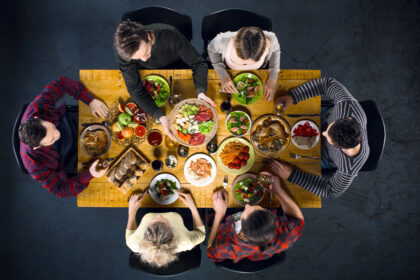The same amount of food looks different on different plates. Not just different sizes of plates, although that does influence how food appears. We tend to eat less food when it’s served on a red plate. And plates with wider, deep colored rims make food seem more plentiful.
Beyond just how food looks, people find that food even tastes differently on different plates. White round plates fool our palates into make food taste sweeter. Angular black plates enhance savory flavors. The same food. The same quantity. Yet we might have very different experiences of it based on its plate.
If we extend this awareness out to other areas of life, maybe we discover that the same commitments feel different to us based on the “plate” of our lives. Something that seemed fulfilling and sweet to us when it first landed on our plate may “taste” entirely differently when the circumstances surrounding that commitment change.
As we consider the value of generosity this month, we might immediately think of people who pile things onto their plates because they don’t think there will be enough. Maybe we’ve been that person on occasion, making sure we get what we need out of fear that there won’t be enough to go around. We’ve talked about how a deeper sense of our interdependence might help us be more aware of everyone’s plate, and the reality that we can all have enough if we’re thoughtful about one another’s needs.
I’m thinking of plates a little differently, though. Sometimes, we put a lot on our plate by taking on abundant commitments. Maybe some of the things on our plate feel nourishing to us. Maybe some feel like obligations. Maybe some feel differently now than they initially felt when they landed on our plate. And maybe our plate is different now too.
We may not need every commitment we’ve invited onto our plate. It may be that generosity looks like offering people around us opportunities to take a little bit onto their own plates.
Not just dumping the contents of our plate onto some unsuspecting soul so we can be free of our burdens. And also, not just dumping our plates onto the floor and hoping someone comes along and picks up anything important that we just can’t fit on our plates the way we thought we could. But instead, thoughtful invitation for people to take a little bit off our plate, and to feel the same nourishment or satisfaction we had hoped to feel.
It’s like recognizing we have way more food than we can eat on our plate and offering some of our garlic mashed potatoes to someone who doesn’t seem to have very much on their plate. We wouldn’t just dump mashed potatoes on their plate, or throw spoonfuls toward their mouth hoping they have quick reflexes. We might say, “Would you like some of these garlic mashed potatoes? I don’t need all of this.” And then, they can take a portion that feels right to them.
People who care about the same things we do might have very different plates from us. Our community thrives when everyone has just the right amount of commitments on their personal plates. It won’t be the same for each person. But we may need to invite people to take a little bit off our plates so that they too have the experience of being in fulfilling relationship with the larger community, feeling as needed and important as everyone else, with the opportunity to do things that nourish themselves and the people around them.
Are you one of those people who has way more than you need on your plate? How aware are you of the plates of everyone else in our community? What would it look like for everyone to have just the right amount on their plates, including you?
Share this post:
